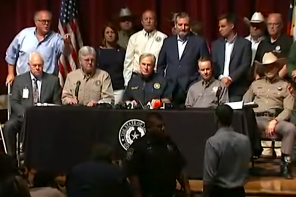Appearing on The Brody File, Rand Paul, who believes that portions of the 1964 Civil Rights Act need “further discussion” and may violate private business owners’ First Amendment rights, said that we wouldn’t really need laws in this country if everyone were a good Christian:
I’m a Christian. We go to the Presbyterian Church. My wife’s a Deacon there and we’ve gone there ever since we came to town. I see that Christianity and values is the basis of our society. . . . 98% of us won’t murder people, won’t steal, won’t break the law and it helps a society to have that religious underpinning. You still need to have the laws but I think it helps to have a people who believe in law and order and who have a moral compass or a moral basis for their day to day life.
Although Paul attends a mainline Protestant church, in his comments one might hear an echo of Christian Reconstructionism. RD contributor Julie Ingersoll, an expert on Christian Reconstructionism, once described it to me this way: “Reconstructionists claim to have an entirely integrated, logically defensible Christian worldview. Reconstructionism addresses everything you have to think about.” In other words, as a society we should follow (preferable) biblical law, and dispense with all but a small handful of civil laws.
The younger Paul may not be an ardent Christian Reconstructionist — he may not even realize its influence on his views — but his father, Congressman Ron Paul, used to employ one of Christian Reconstrutionism’s leading thinkers, Gary North, on his staff. North is the son-in-law of the founder of Christian Reconstructionism, R.J. Rushdoony.
Howard Phillips, the former Nixon administration official who founded the Conservative Caucus and Constitution Party (formerly the U.S. Taxpayers Party) and co-founded the powerful Council for National Policy, claims Rushdoony as his mentor. Phillips once observed, “Much of the energy in the home school movement, the Christian school movement, the right-to-life movement, and in the return of Christians to the political world, is directly traceable to Dr. Rushdoony’s work.” James Dobson, who offered a last-minute endorsement of Paul, had voted for Phillips in 1996 as “protest vote” against the GOP. Ron Paul spoke at the Constitution Party’s fundraiser in 2009, as did John Birch Society president John McManus.
Reconstructionists share the worldview of the John Birch Society, which as Adele Stan reported, has enthusiastically praised Paul’s victory over Republican Trey Grayson. (In 1963 — the year Rand Paul was born and, he claimed on Rachel Maddow’s show, he would have marched with Martin Luther King, Jr. — the John Birch Society insisted that proposed civil rights laws were “in flagrant violation of the 10th amendment,” and threatened individual freedom.) On the 40th anniversary of the Civil Rights Act, in 2004, the elder Paul stated on the floor of the House, “The Civil Rights Act of 1964 not only violated the Constitution and reduced individual liberty; it also failed to achieve its stated goals of promoting racial harmony and a color-blind society.” (h/t Rachel Maddow’s twitter feed).
Many Christian Reconstructionists believe certain forms of slavery are biblical. As I wrote in a post last month, the resurgence of the JBS (it was a co-sponsor of this year’s Conservative Political Action Conference) alongside Christian Reconstructionism signals a resurgence of the sort of mish-mash of states’ rights and individual liberty arguments made by libertarians and tea partiers — in Paul’s case, federal civil rights laws are portrayed as some sort of government invasion of liberty — in which civil rights protections are flipped on their head and portrayed as antithetical to (white people’s) freedom.
Diana Butler Bass, who dissected Virginia Governor (then candidate) Bob McDonnell’s thesis as a piece of Christian Reconstructionist thinking, told me after McDonnell omitted mention of slavery from his proclamation of Confederate History Month:
I don’t think it is any coincidence that Bob McDonnell dismissed slavery—since [Christian Reconstructionism] thinks slavery is not only permitted by scripture but it a necessary part of an ordered biblical society. And [Christian Reconstructionism] also explains Bob McDonnell’s view on gay people. You don’t need to advocate slavery or stoning homosexuals to functionally and metaphorically “agree” with those things in their 21st century guise—such as proclaiming Confederate History Month or taking away basic civil rights for LGBT folks. Such proclamations and executive orders are the contemporary equivalent of advocating stoning.
Others have deftly shown what’s historically wrong with Paul’s claims. As Blair L. M. Kelley wrote at Salon, Paul’s arguments “echo the arguments made for segregation in his state before the turn of the 20th century,” when, in Kentucky, a state senator “proposed a new law requiring railroads ‘to furnish separate coaches or cars for the travel or transportation of the white and colored passengers.'”
At TAPPED, Adam Serwer unpacked Paul’s feeble defense of his stance (claiming that he finds racism “abhorrent” and would have marched with King):
The problem with the conservative appropriation of King based on a single sentiment made during the “I Have a Dream” speech — the only King speech they’ve bothered to read — is that it ignores the basic fact that the civil-rights movement was a fight for more and better government.
Black people had been living in the “leave it to the states” nightmare since Reconstruction, during which the war-weary North abandoned black people to the terrible lawlessness of a vengeful South. Civil-rights movement leaders were fighting for the federal government to secure their rights against the arbitrary tyranny of the political powers in the Southern states, which maintained their hold on local government through coercion and violence.
Paul seems to think that good Christians don’t need civil laws (or civil rights laws, for that matter) for them to do the right thing. But it’s crucial to acertain what that “right thing” really is.




